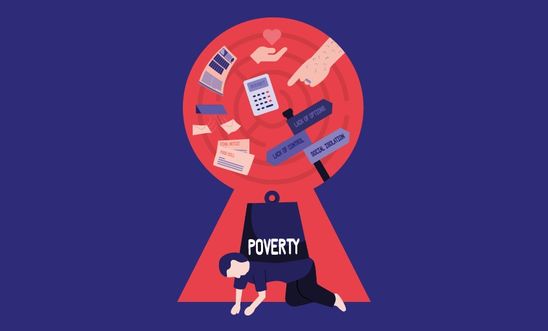
Understanding poverty and social rights through lived experience

Written by Thomas Croft and Moraene Roberts, National Coordination Team of ATD Fourth World.
Too many people are falling through gaps in service provision in the UK today. Many have no choice but to sleep rough and resort to food banks. Given the growing awareness that poverty is multidimensional, it is crucial to ask the most affected people what that means.
For the past three years, ATD Fourth World UK has carried out participatory research on 'Understanding Poverty in All Its Forms'. The research has been part of a global research project, which is a collaboration between ATD Fourth World International and the University of Oxford. Our report on the British findings is being launched on 14 October in a conference hosted by Amnesty UK and supported by Just Fair UK.
This new report matters because the voices of people with direct experience of poverty were co-researchers at the forefront of designing, carrying out, and interpreting the research. Coming together to share our thoughts and experiences and then synthesising our different views has been arduous, complex—and extremely rewarding. We have agreed that poverty is a problem that is deeply rooted in our institutions; this is reflected in widely held social attitudes that undermine and marginalise people living in poverty. As well as being an ancient problem, poverty has a modern face in an era of growing inequalities and social divisions.
Our research has shown that poverty in the United Kingdom today is still experienced as a lack of material resources and opportunities and that it is also experienced as a stigmatising label that blights lives. Poverty is an affront to human dignity that excludes and punishes people and makes them ill.
This study reinforces that people with lived experience of poverty should not be defined by their lack of privilege; and that they and are capable, purposeful, imaginative and well able to provide a sophisticated analysis of how poverty comes about and is maintained. Their insights have been supported and given depth by others in the study who have offered professional and research-based knowledge into how poverty and marginalisation affect the life chances of people.
The research findings identify six dimensions that describe poverty in all its forms in the UK:
- disempowering systems, structures and policies
- financial insecurity, financial exclusion, and debt
- damaged health and well-being
- stigma, blame and judgement
- lack of control over choices
- unrecognised struggles, skills and contributions.
The co-researchers identified seven key messages:
- It is essential that people with lived experience participate in tackling poverty. This requires time, careful planning and commitment.
- There is a need for better indicators of poverty that emphasise and capture the human experience of poverty.
- Inadequate financial resources are a cause of poverty that take away control and shorten lives.
- The impact of stigma and negative judgement is a particularly painful part of poverty.
- Participants agreed services should be enabling and supportive; but some services are experienced as controlling and oppressive.
- The skills and contributions made to society by people in poverty often go unrecognised.
- Individual resilience is no substitute for better systems, structures and policies.
We hope that this study and our messages will contribute to understanding poverty in all its forms in the UK. In line with the Sustainable Development Goals, our aim is to influence international efforts to understand how material inequalities undermine well-being and personal and social development. We hope these messages will lead to further studies on the effects of poverty. We are committed to sharing what we have learned because we want our way of working — putting the voices of people with experience of poverty front and centre — to become the norm in research rather than the exception. We have developed important experience in co-production — in research design, data collection and analysis — and in addition, our messages have lessons for policy makers, planners, service providers, commissioners and funders. We hope that they will be considered carefully and taken to heart.
Our blogs are written by Amnesty International staff, volunteers and other interested individuals, to encourage debate around human rights issues. They do not necessarily represent the views of Amnesty International.
0 comments